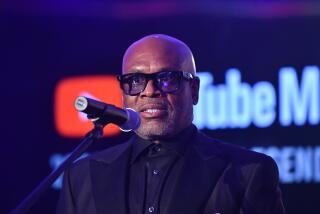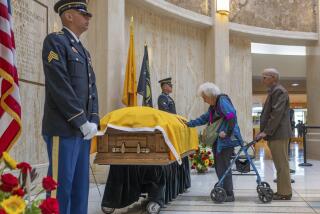Elliot Richardson Dies; Defied Nixon
- Share via
WASHINGTON — Former Atty. Gen. Elliot L. Richardson, who became a symbol of government integrity when he refused to carry out President Richard Nixon’s order to fire the Watergate prosecutor, died Friday of a cerebral hemorrhage at a hospital in Boston. He was 79 years old.
Richardson, who had been in failing health in recent years, assured his place in history in the so-called “Saturday night massacre” of Oct. 20, 1973, when he resigned from Nixon’s Cabinet rather than fire special prosecutor Archibald Cox.
When Richardson resigned, the No. 2 official at the Justice Department, William Ruckelshaus, also quit, leaving the firing of Cox to then-Solicitor General Robert H. Bork. The abrupt weekend shake-up--so uncharacteristic of the mannered way in which personnel changes usually occur in Washington--stunned the public and escalated doubts about Nixon’s truthfulness as the Watergate scandal dragged on.
Richardson returned to the Justice Department the following Monday morning to explain his action to department employees and was greeted with a tumultuous standing ovation in the department’s Great Hall. At a time when morale was low for many government lawyers because of the growing Watergate scandal, Richardson’s determination to uphold a legally established investigation provided them an emotional high point, many would say later.
The reaction was more mixed among many Republican Party officials who remained loyal to Nixon. Richardson had served the administration as secretary of Health, Education and Welfare, secretary of Defense and undersecretary of State and his decision to quit the high-profile attorney general’s post struck these GOP partisans as grandstanding.
While outwardly calm about his action, Richardson in fact was deeply troubled, some friends said, precisely because he thought that he owed loyalty to Nixon. But he believed he could not compromise his legal and ethical standards, given that he had promised the Senate Cox would be guaranteed independence in his investigation.
While considered a pariah by many Republicans for months after that fateful Saturday night, Richardson returned to public service shortly after Nixon resigned from office in August 1974. Nixon’s successor, President Ford, appointed him secretary of Commerce and later ambassador to Great Britain. Richardson, who maintained a private law practice in Washington until retiring in 1992, was one of 15 Americans honored by President Clinton last January with the Presidential Medal of Freedom.
Noting that Richardson had headed more Cabinet departments than any other person in history--four--Clinton called him “a man of principle . . . who has earned our lasting gratitude for the highest standards of service to our nation.”
On Friday, Clinton praised Richardson as “a man of uncommon integrity,” adding that he “put the nation’s interests first even when the personal cost was very high.”
Richardson himself recognized that he was destined to be best remembered for the part he played in the Saturday Night Massacre. He later referred to it as “my brief period of notoriety.”
Nixon was angry that Cox, while investigating suspected White House involvement in the effort to cover up the 1972 break-in at Democratic Party offices at Washington’s Watergate Hotel, was pressing for White House audio tapes. Nixon proposed a compromise under which the tapes would be given to conservative Sen. John Stennis (D-Miss.), who would review them and verify their content to Cox. But Cox and his prosecutors insisted on obtaining the tapes themselves.
Leon Jaworski, a Texas lawyer named to succeed Cox in late 1973, won a Supreme Court decision the following year that Nixon must relinquish the recordings. Disclosure of their content weeks later and passage of articles of impeachment by the House Judiciary Committee, led to Nixon’s resignation.
Richardson later would write about the Cox episode in his 1996 memoirs, “Reflections of a Radical Moderate.”
“The more I thought about it, the clearer it seemed to me that public confidence in the investigation would depend on its being independent not only in fact but in appearance,” he wrote.
And in discussing Nixon’s predicament, he wrote: “The height of irony was that even a belated display of openness could have saved Nixon from the consequences of his own evasion of it.”
Instead of refusing Cox access to the tapes, Richardson went on, the Nixon administration “ought instead tell Archie Cox to send over a truck and load it up with all the material he and his staff could possibly want. If anything damaging was found, Nixon could issue a public apology and couple it with a convincing expression of penitence. The American people, I thought, would be more than likely to forgive and forget.”
Richardson died at Massachusetts General Hospital two days after being admitted, hospital spokeswoman Nicole Gustin said. Before his career in Washington, the Boston native and Harvard graduate won election in Massachusetts both as attorney general and lieutenant governor. His successes helped resurrect the Republican Party in the state.
He attempted a political comeback in 1984 in Massachusetts but lost his bid for the U.S. Senate.
Regarded as a moderate and a “Boston Brahmin” by many, his outward appearance of cool arrogance belied an inner warmth and playfulness. He loved to draw cartoons and was an avid doodler during government conferences and congressional testimony. Some of his more elaborate doodles were donated to charities and purchased by collectors.
Until recent years, the sturdy 6-footer was an avid participant in outdoor sports such as skiing, canoeing and tennis.
Richardson married Anne Francis Hazard in 1952. She died in July. They had three children--two sons and a daughter--who survive him.
More to Read
Get the L.A. Times Politics newsletter
Deeply reported insights into legislation, politics and policy from Sacramento, Washington and beyond. In your inbox twice per week.
You may occasionally receive promotional content from the Los Angeles Times.










